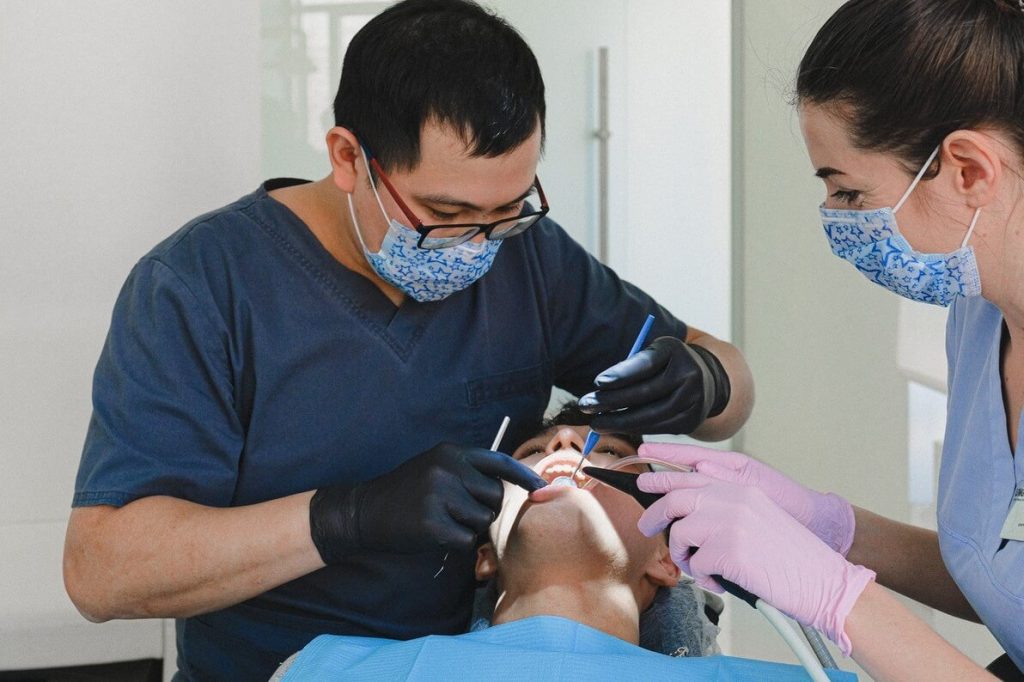Is it possible to keep your gums healthy all the time, all year round? Of course, yes!
It will be an injustice if we fail to talk about your gum’s health when talking about general and dental health. That you can afford a smile and crush even the most rigid bones, that doesn’t mean that you are immune to and have healthy gums.
Gum diseases are mostly painless, and you wouldn’t know if you have contracted them as they don’t have any early signs and symptoms.
Moreover, it is essential to note that even white smiles and healthy teeth require healthy gums.
What Is Gum Disease?
When sticky food deposit remains on teeth, they create a space for bacteria to proliferate under and along the gum line, causing gum diseases. These sticky film-like substances are harmful to the gums and bone and cause tooth decay.
Plaques are sugary and acidic and can also cause gingivitis, which is an early stage of gum disease. Gingivitis causes your gums to feel tender, inflamed, swollen, red, and prone to bleeding.
When the disease advances to the second stage, it develops periodontitis. Periodontitis affects the bones that firmly hold your teeth. If periodontitis is not treated in good time, it will damage the bones, gums, and tissues that connect to your teeth.
The last and advanced stage of gum disease is known as advanced periodontitis. The bone and fibers that hold your teeth are completely destroyed at this stage. It can impact your chew, and teeth may need to be extracted.
But here is the great news, gum disease is avertable.
Here are 6 ways you can help keep your gums healthy.
- Do Regular Flossing To Make Your Gums Healthy
Flossing helps remove plaques and food remains. Its effects go beyond your toothbrush’s reach. It also helps stimulate the gums, lower inflammation and reduce plaques.
- Get Regular Dental Cleanings For Healthy Gums
It is possible to detect gum diseases in their early stages when you frequently visit your dentist. Professional and regular cleaning will help remove tartar and plaques missed when flossing or brushing.
Another benefit of regular dental cleaning is, it reverses other symptoms such as gingivitis and periodontitis.
- Quit Smoking
Smoking causes tooth discoloration and gum disease. It also weakens your immune system, making it harder for your immune to fight off a gum infection.
Therefore, quit smoking and make it easy for your gums to heal faster once they are damaged.
- Brush Twice a Day To Make Your Gums Healthy
Brushing your teeth after every meal helps remove plaque and the food trapped between your gums and teeth.
While brushing, ensure that you scrub your tongue, too, since bacteria also find it as a breeding space. Spend at least two minutes on your teeth.
Use the right toothbrush to move in gentle circular motions to eliminate plaques.
Also, consider changing your toothbrush every three to four months, or sooner if the bristles start to fray.
- Use Fluoride Toothpaste
Fluoride toothpaste is a leading defense against tooth decay and sensitive teeth. It strengthens, whitens, and protects your gums from bacterial infections.
No matter the toothpaste you choose to use, ensure it contains fluoride.
- Use a Healing Mouthwash
Therapeutic mouthwash will help rinse your mouth, eliminate debris and heal your damaged gums. It also helps prevent gingivitis reduces the spread of tartar and plaques.
Mouthwash also helps reduce the amount of acid in the mouth and cleanses hard-to-brush areas in and around the gums.
Mouthwash is a good option for children and aged people where brushing and flossing may not be ideal.
A Must-read: Everything You Need To Know About Dental Care
Signs and Symptoms of Unhealthy Gums
Since the signs and symptoms of unhealthy gums are mild and at times unnoticeable, you must maintain a regular visit to the dentist. However, if you cannot, keep a note on these signs before the situation gets worse.
- Gingivitis
This is the first and the mildest sign of gum disease. When you start developing gingivitis, you may experience red, swollen gums that bleed easily and frequently. You may also experience chronic bad breath.
People with gingivitis may not experience any pain or tooth loosening at first.
However, the condition is treatable and reversible with good oral hygiene and dental care.
- Periodontitis
Periodontitis is another sign of unhealthy gums. This sign is an escalation of untreated gingivitis. It occurs when tartar and plaque rapidly spread below the gum line.
The tartar and plaques cause irritation and inflammation in the gums, destroying the tissues and bone that support the teeth.
- Advanced Periodontitis
As periodontitis advances, it sparks another symptom known as advanced periodontitis. This stage is worse than the previous one as it weakens and destroys the space between the teeth and the connective tissues.
- Bad Breath
Most people struggle with bad breath, not knowing that it’s a condition associated with unhealthy gums. It comes from poor dental hygiene caused by food residues trapped between teeth.
Bad breath also causes inflammation in the gums and other oral issues.
Daily flossing and gargling of mouth wash will help prevent this cause and keep bacteria along the gum line at bay!
- Excess Saliva
Too much saliva is another sign of unhealthy gums. It acts as a thriving space for bacteria that causes the disease.
A possible solution to reducing the amount of saliva in your mouth is by gargling warm salty water to help ease the discomfort.
However, you can reverse this condition with the help of a dentist.
Also Read: 6 Healthy Diet Facts You Must Know
Summary
Since your teeth and mouth are used for many things, anything can go wrong more so if you don’t give them the best treatment and care.
Gum disease leads to severe tooth loss. However, the condition is preventable, treatable, and reversible in most people only if they adopt and maintain proper oral hygiene practices.
The practices look ordinary and straightforward. Those practices include flossing, taking care when rinsing out the mouth, and brushing the teeth regularly with fluoride toothpaste.
Therefore, seeing a dentist regularly and staying on top of your daily oral care will help prevent cavities and reduce your risk of severe gum disease and eventually tooth loss.


